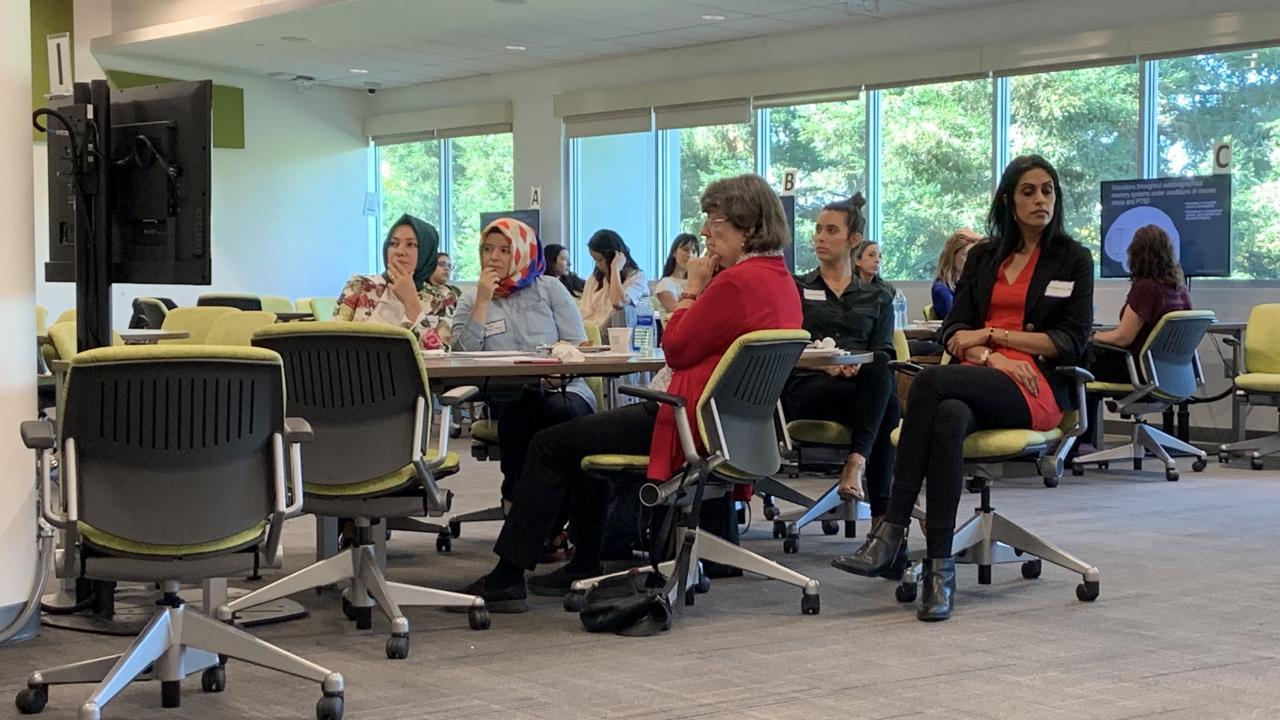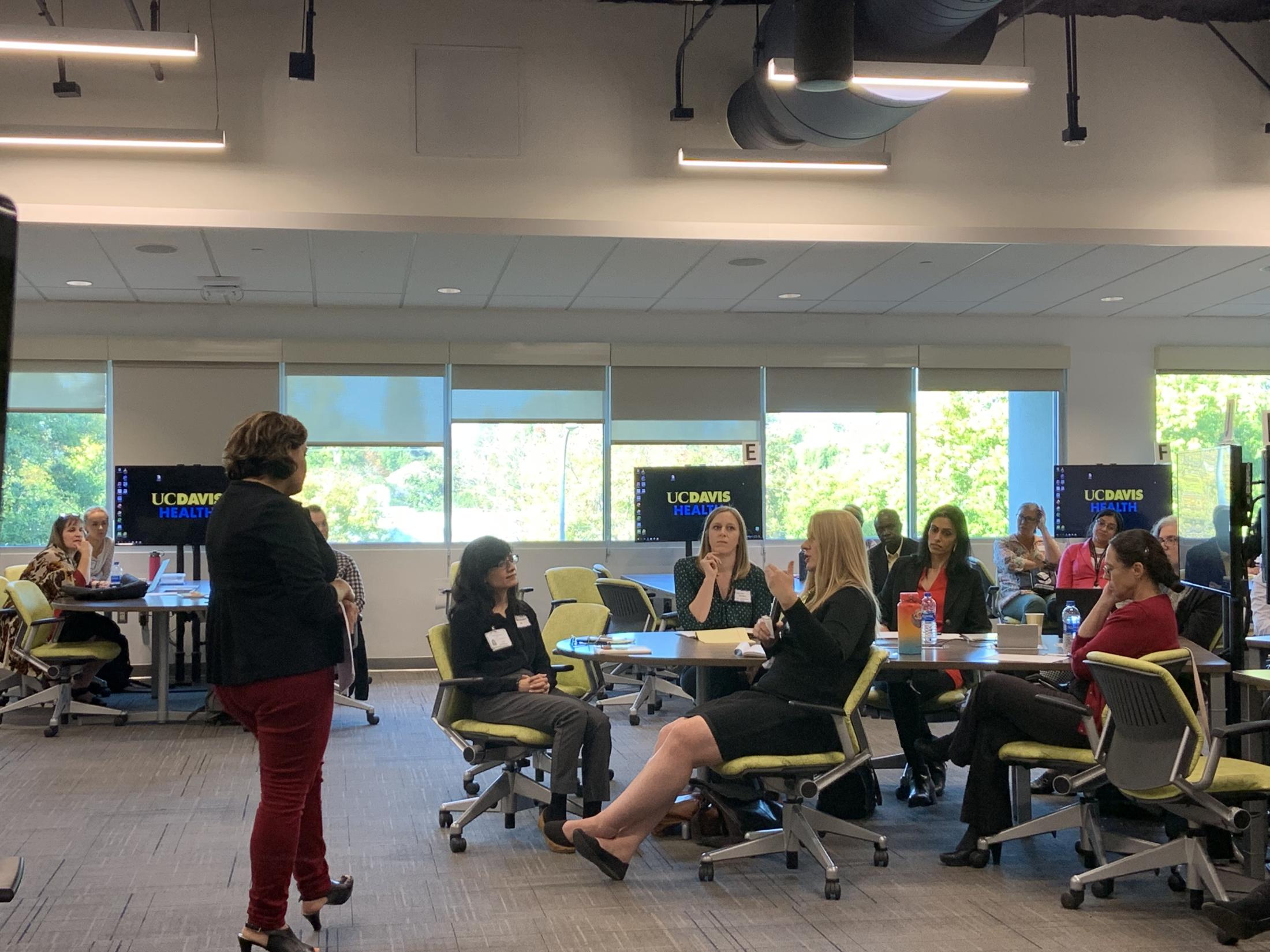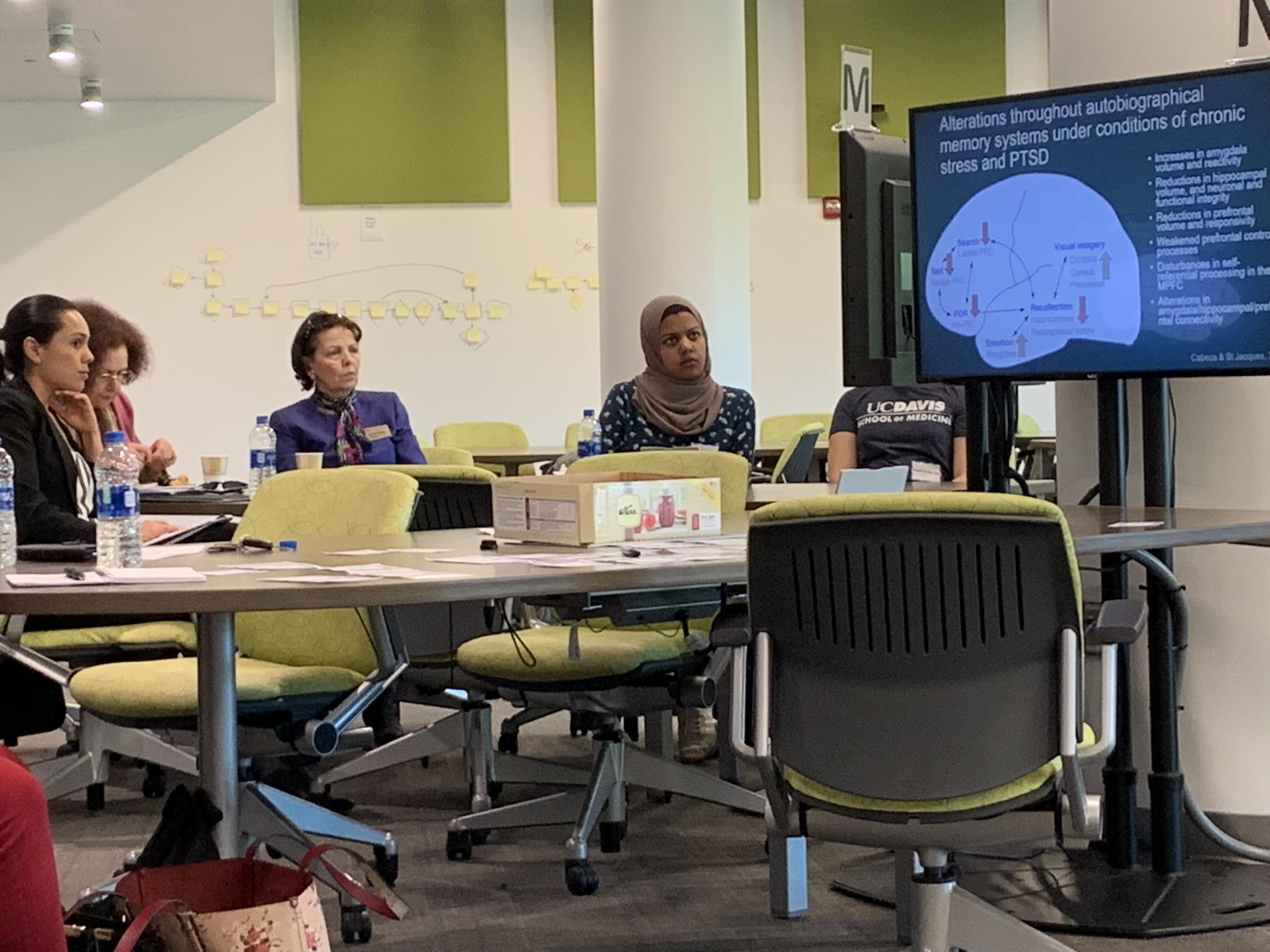
Transforming Refugee Mental Health: Focus Group Findings on Migrant Legal-Mental Health Intersectionality
On October 25, 2019, Raquel E. Aldana, Associate Vice Chancellor for Academic Diversity and Professor of Law, and Dr. Patrick Marius Koga, Director of the Refugee Health Research in the Department of Public Health Sciences, hosted their second forum on migration and trauma at UC Davis. The event was part of a project titled Transforming Refugee Mental Health: Improving Legal Assessment of Credibility through Science and made possible through a seed grant from the Office of Global Affairs.
 The goals of this event were to share the focus group findings of the first forum of November 2018, and to nurture interprofessional practices among neuroscientists, psychologists, psychiatrists, therapists, nurses, legal researchers, educators, and advocates, refugee resettlement agencies, county refugee clinics, and the Office of Refugee Health at CDPH. In response to the ongoing crisis of global forced displacement, over 70 participants from the Schools of Law, Medicine, and Nursing, lawyers, advocates, health professionals, and community leaders who work directly with refugees and other vulnerable migrant communities, were challenged to promote better trauma-informed practices, policies, and laws.
The goals of this event were to share the focus group findings of the first forum of November 2018, and to nurture interprofessional practices among neuroscientists, psychologists, psychiatrists, therapists, nurses, legal researchers, educators, and advocates, refugee resettlement agencies, county refugee clinics, and the Office of Refugee Health at CDPH. In response to the ongoing crisis of global forced displacement, over 70 participants from the Schools of Law, Medicine, and Nursing, lawyers, advocates, health professionals, and community leaders who work directly with refugees and other vulnerable migrant communities, were challenged to promote better trauma-informed practices, policies, and laws.
The forum participants were welcomed by Professor Brad Pollock, Associate Dean for Public Health Sciences and Department Chair, Professor Michael Wilkes, Director of Global Health Sciences, and Dr. Elizabeth Langridge-Noti, Director of Faculty Engagement in Global Affairs. In her remarks, Dr. Langridge-Noti, noted how this seed grant exceeded Global Affairs’ expectations of what is possible with small investments when the impetus for innovation and ongoing engagement is born from urgency and sustained by the commitment and talent of the persons in the room.
Professor Aldana opened the day by acknowledging that the project’s most important contribution has been the bringing together of legal and health professionals who should be talking to one another but who are often too busy doing the good work of treating or advocating for migrants who are experiencing trauma. To start the conversation, Dr. Koga laid out insights from the first forum by revealing wide gaps – but also opportunities -- in trauma-informed practices with migrants and refugees here in the US and all over the world. He pointed out the promising outcomes of the first forum such as the direct engagement of refugees in the project, the interprofessional teamwork to write a research paper on the focus group study, to conduct a systematic review of the mental health impacts of restrictive and deterring immigration policies in the United States, the participation of sixteen refugee/immigrant background postdocs, undergraduate, medical, MPH, and doctoral students in this project, the 2019 lectures at UCD Medical and Law Schools, and the novel refugee research elective rotation for 4th year medical students offered at the Ulysses Postdoctoral Refugee Research Training Program (Ulysses PoRT) at PHS Dept. in the UCD School of Medicine.
Aldana reminded participants that this second gathering moved us beyond the identification of problems and the first round of concrete results, to narrow these gaps by forging more outcome-driven collaborative work in the TRMH’s global and long-term strategy. “We want to be intentional,” Aldana said, “and focus on solutions that are feasible and whose implementation at least rests with each of us in the room. This is not to say that we think small or that we ignore the structural, social, legal, and cultural shifts that have to occur for impactful change. Rather, the focus on what each of us can do now in partnership with one another is a real effort to battle the despair and the compassion fatigue we all feel as a result of this very dark period for migrants in the US and worldwide”
 The day’s program flowed along the continuum of four discipline-specific panels providing important content to inform these partnerships: 1) Neuroscience Research on Traumatic Stress in Migrants (Alea Skwara, Dr. Susan Rivera, Dr. Camelia Hostinar, Dr. Johnna Swartz); 2) Migrant Trauma and Mental Health Services (Dr. Hendry Ton, Abigail Stepnitz, Jamie Rizzo, Homeyra Ghaffari); 3) Refugee Mental Illness versus Ulysses Syndrome (Dr. Tyler Evans, Esma Nacakgedigi, Dr. Hadeer Al-Ani, Dr. Fahim Pirzada, Dr. Ali Ghasemi, Nahid Kabbani, Dr. Onur Nacakgedigi, Dr. Marius Koga); and 4) Migrant Trauma and Legal Representation (Chelsea Sachau, Professor Holly Cooper, Professor Amagda Perez, Dr. Satinder Gill, Professor Raquel Aldana). The day began with research-based presentations from neuroscientists and psychologists on trauma’s effects on memory and storytelling, which helped elucidate the gaps between law and science in a subsequent presentation detailing research on how immigration courts assess credibility in U.S. asylum cases. The obvious question from these presentations is how might increasing lawyers’ and policy makers’ understanding of trauma science could lead us to change the irrational ways in which most legal systems today do credibility assessments in asylum cases. This conversation is already starting to happen – but changes to policy are not coming quickly enough. Still, we see enormous potential in the room to try to speed up that needle given policy makers’ interest in improving accuracy and efficiency.
The day’s program flowed along the continuum of four discipline-specific panels providing important content to inform these partnerships: 1) Neuroscience Research on Traumatic Stress in Migrants (Alea Skwara, Dr. Susan Rivera, Dr. Camelia Hostinar, Dr. Johnna Swartz); 2) Migrant Trauma and Mental Health Services (Dr. Hendry Ton, Abigail Stepnitz, Jamie Rizzo, Homeyra Ghaffari); 3) Refugee Mental Illness versus Ulysses Syndrome (Dr. Tyler Evans, Esma Nacakgedigi, Dr. Hadeer Al-Ani, Dr. Fahim Pirzada, Dr. Ali Ghasemi, Nahid Kabbani, Dr. Onur Nacakgedigi, Dr. Marius Koga); and 4) Migrant Trauma and Legal Representation (Chelsea Sachau, Professor Holly Cooper, Professor Amagda Perez, Dr. Satinder Gill, Professor Raquel Aldana). The day began with research-based presentations from neuroscientists and psychologists on trauma’s effects on memory and storytelling, which helped elucidate the gaps between law and science in a subsequent presentation detailing research on how immigration courts assess credibility in U.S. asylum cases. The obvious question from these presentations is how might increasing lawyers’ and policy makers’ understanding of trauma science could lead us to change the irrational ways in which most legal systems today do credibility assessments in asylum cases. This conversation is already starting to happen – but changes to policy are not coming quickly enough. Still, we see enormous potential in the room to try to speed up that needle given policy makers’ interest in improving accuracy and efficiency.
This – the possibility of the feasible and an acknowledgment of interest convergence to create some changes even now -- is what motivated our thinking in the organization of our panels and the choosing of our speakers. Another large theme in the room, given the large presence of educators, focused us on what research universities like UC Davis should be doing in terms of research, curriculum reform, and service to improve the ways we prepare our students, treat our patients or clients, or help policy makers understand trauma and migration. It was powerful to learn of existing initiatives in the room – such as holistic approaches to the treatment of migrant trauma by our medical professionals – and the collaboration between clinical psychologists and legal clinics to help students cope with vicarious trauma. We even learned of existing research at UC Davis at the intersection of science and law such as on the lessons that developmental psychologists can offer immigration adjudications of cases involving unaccompanied minors. Even more empowering is that new connections were forged and many, including several nursing and psychology students, left wanting to reach out across the causeway to connect with the law school to explore how to together we can connect dots and imagine multi-disciplinary solutions that will start to break down at least some of our own borders. The seed of this project has sprouted; our next step will be to contain and nurture the sprout’s growth to its full potential. The project’s repository website, to be developed this winter by co-PIs Aldana and Koga, will allow partners access, navigate, and contribute to their chosen subprojects, while also keeping in sight the overall progress of the TRMH work and vision. Essential to the viability of this interprofessional project – Dr. Koga reiterates- is that the vulnerable migrants themselves, with their concerns, input, and expertise, remain directly involved in the ongoing works and oversight of TRMH.
